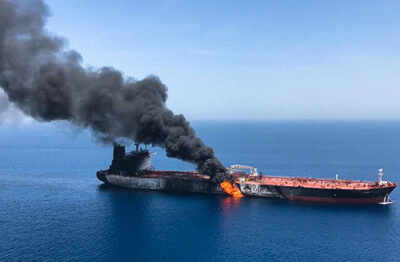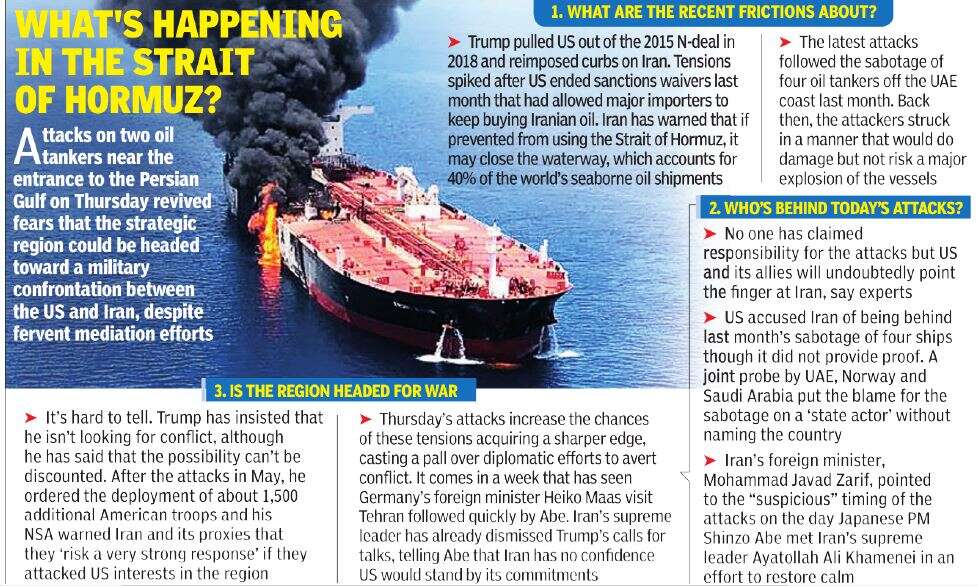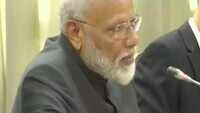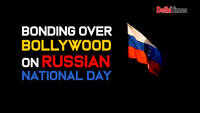
WASHINGTON: US secretary of state Mike Pompeo said on Thursday that intelligence reviewed by American officials showed that Iran was responsible for fresh attacks on two oil tankers in the Gulf of Oman, a critical waterway for the transit of much of the world's petroleum.
Crude prices climbed as much as 4% after the attacks near the entrance to the Strait of Hormuz, a crucial shipping artery for Saudi Arabia, the world's biggest oil exporter, and other Gulf energy producers. "If the waters are becoming unsafe, the (oil) supply to the entire Western world could be at risk," said Paolo d'Amico, chairman of Intertanko tanker association.
Pompeo did not present any evidence of Iran's involvement when announcing the findings at a news conference in Washington. The assertion is certain to fuel tensions between the Trump administration and Iranian leaders that have increased since early May, when the White House announced military movements in response to what American officials have said is a heightened threat from Iran.
Pompeo said the sabotage against the two tankers was only the latest in a series of recent violent acts by Iran. "Taken as a whole, these unprovoked attacks present a clear threat to international peace and security," he said.

Thursday's incidents, including the assault on Japanese-operated vessel Kokuka Courageous and Norwegian tanker Front Altair , were the second in a month to hit ships near the Strait of Hormuz chokepoint, through which about 40% of the world's seaborne oil travels. They come as Japanese Prime Minister Shinzo Abe, a rare ally of both US President Donald Trump and Iranian leaders, visits Tehran in an effort to ease tensions.
The rapid escalation of tensions in early May between the US and Iran took place around the time that four tankers were damaged by explosions at the mouth of the Persian Gulf, near the Strait of Hormuz. The violence that occurred in the same area early Thursday morning, which forced crews to abandon ship and left one vessel blaze, was similar to the incidents from May.
Pompeo and John R Bolton, the national security adviser, both said in late May that Iran was responsible for those attacks, though neither have presented evidence. On May 30, Pompeo told reporters that he had seen evidence of Iranian involvement and asserted "these were efforts by the Iranians to raise the price of crude oil throughout the world".
Iran distanced itself from any attack. "Iran is concerned by the suspicious events around commercial tankers related to Japan," foreign ministry spokesman Abbas Mousavi, was quoted as saying on Fars news agency. "We see this as going against efforts from within the region and beyond to reduce tensions." Iranian foreign minister Mohammad Javad Zarif described the incidents as "suspicious" on Twitter and called for regional dialogue.
Details of the incidents on Thursday have remained murky, as they have for the explosions in May. Pompeo and Bolton have led the Trump administration in taking a hard stand on Iran. In May 2018, President Trump withdrew from a nuclear containment deal that the Obama administration and world powers reached with Iran in 2015. The US reimposed harsh sanctions on Iran last November. European allies have stayed in the nuclear deal and have urged Iran to do so, but President Hassan Rouhani said last month that Iran would start leaving parts of it, even though international agencies said Tehran had been abiding by all the terms until now.
Trump has said in recent weeks that he was open to negotiations with Iran, though he has made no real effort to start talks. He has also said he could take military action. In late May, he announced he was sending an additional 1,500 troops to West Asia, though that was far less than what some top administration officials had requested.
Pompeo has made 12 dema nds of Iran that go far beyond the nuclear issues. In his talks, he has stressed the need to roll back Iran's "expansionist foreign policy" and tamp down the influence of the political and military groups in Arab nations that are supported by Iran. From his perspective, that includes Hezbollah in Lebanon, the Houthi rebels in Yemen and a constellation of armed groups in Iraq.
Russia, one of Iran's main allies, was quick to urge caution, saying no one should rush to conclusions about the incident or use it to put pressure on Tehran.
Crude prices climbed as much as 4% after the attacks near the entrance to the Strait of Hormuz, a crucial shipping artery for Saudi Arabia, the world's biggest oil exporter, and other Gulf energy producers. "If the waters are becoming unsafe, the (oil) supply to the entire Western world could be at risk," said Paolo d'Amico, chairman of Intertanko tanker association.
Pompeo did not present any evidence of Iran's involvement when announcing the findings at a news conference in Washington. The assertion is certain to fuel tensions between the Trump administration and Iranian leaders that have increased since early May, when the White House announced military movements in response to what American officials have said is a heightened threat from Iran.
Pompeo said the sabotage against the two tankers was only the latest in a series of recent violent acts by Iran. "Taken as a whole, these unprovoked attacks present a clear threat to international peace and security," he said.

Thursday's incidents, including the assault on Japanese-operated vessel Kokuka Courageous and Norwegian tanker Front Altair , were the second in a month to hit ships near the Strait of Hormuz chokepoint, through which about 40% of the world's seaborne oil travels. They come as Japanese Prime Minister Shinzo Abe, a rare ally of both US President Donald Trump and Iranian leaders, visits Tehran in an effort to ease tensions.
The rapid escalation of tensions in early May between the US and Iran took place around the time that four tankers were damaged by explosions at the mouth of the Persian Gulf, near the Strait of Hormuz. The violence that occurred in the same area early Thursday morning, which forced crews to abandon ship and left one vessel blaze, was similar to the incidents from May.
Pompeo and John R Bolton, the national security adviser, both said in late May that Iran was responsible for those attacks, though neither have presented evidence. On May 30, Pompeo told reporters that he had seen evidence of Iranian involvement and asserted "these were efforts by the Iranians to raise the price of crude oil throughout the world".
Iran distanced itself from any attack. "Iran is concerned by the suspicious events around commercial tankers related to Japan," foreign ministry spokesman Abbas Mousavi, was quoted as saying on Fars news agency. "We see this as going against efforts from within the region and beyond to reduce tensions." Iranian foreign minister Mohammad Javad Zarif described the incidents as "suspicious" on Twitter and called for regional dialogue.
Details of the incidents on Thursday have remained murky, as they have for the explosions in May. Pompeo and Bolton have led the Trump administration in taking a hard stand on Iran. In May 2018, President Trump withdrew from a nuclear containment deal that the Obama administration and world powers reached with Iran in 2015. The US reimposed harsh sanctions on Iran last November. European allies have stayed in the nuclear deal and have urged Iran to do so, but President Hassan Rouhani said last month that Iran would start leaving parts of it, even though international agencies said Tehran had been abiding by all the terms until now.
Trump has said in recent weeks that he was open to negotiations with Iran, though he has made no real effort to start talks. He has also said he could take military action. In late May, he announced he was sending an additional 1,500 troops to West Asia, though that was far less than what some top administration officials had requested.
Pompeo has made 12 dema nds of Iran that go far beyond the nuclear issues. In his talks, he has stressed the need to roll back Iran's "expansionist foreign policy" and tamp down the influence of the political and military groups in Arab nations that are supported by Iran. From his perspective, that includes Hezbollah in Lebanon, the Houthi rebels in Yemen and a constellation of armed groups in Iraq.
Russia, one of Iran's main allies, was quick to urge caution, saying no one should rush to conclusions about the incident or use it to put pressure on Tehran.
Download The Times of India News App for Latest World News.
more from times of india news
World Cup 2019
Trending Topics
More from TOI
Navbharat Times
Featured Today in Travel
Get the app









